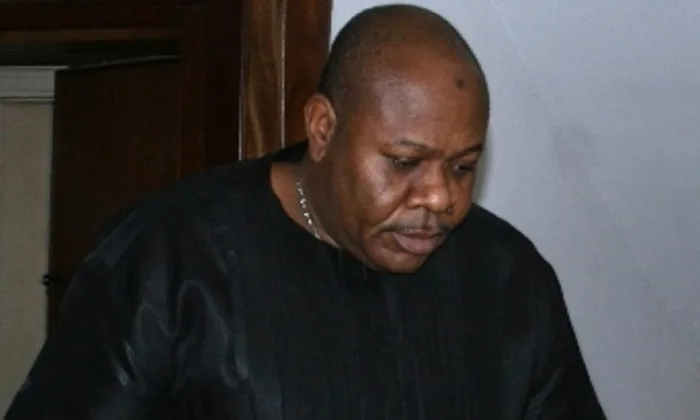The Special Offences Division of the Lagos State High Court, Ikeja, has declined a fresh bail application filed by businessman Fred Ajudua, who is currently standing trial for alleged fraud involving over $1 million.
Ajudua, through his counsel Olalekan Ojo (SAN), asked Justice Mojisola Dada to admit him to bail pending the outcome of his trial, citing serious health concerns. He told the court that Ajudua, who suffers from chronic kidney disease, was brought to court by medical personnel from the Lagos University Teaching Hospital (LUTH).
Ojo urged the court to consider his client’s medical condition, arguing that “only the living can face trial.”
However, counsel for the Economic and Financial Crimes Commission (EFCC), Seidu Atteh, opposed the application. He argued that Ajudua has a pending matter before the Supreme Court, and any such request should have been filed there.
In response, Ojo maintained that the Supreme Court application was unrelated to bail and that the current application was within the jurisdiction of the trial court.
In her ruling, Justice Dada declined to make a determination on the bail request, citing the pending Supreme Court matters.
“In view of the applications filed at the Supreme Court, I am constrained to make any decision with respect to this instant application. I will abide by the decisions of the Supreme Court,” the judge ruled.
The case was adjourned to October 10, October 31, and November 20 for continuation of trial.
Ajudua is being prosecuted for allegedly defrauding a Palestinian national, Zad Abu Zalaf, of $1,043,000 under false pretences.
Before the bail ruling, the court heard testimony from the third prosecution witness, Afanda Bashir Emmanuel, an EFCC investigator. He told the court that he took over Ajudua’s case in 2005 after it was transferred from the Special Fraud Unit (SFU) of the Nigerian Police Force to the EFCC’s Advance Fee Fraud Section.
The witness said several agencies, including the Central Bank of Nigeria (CBN), NNPC Limited, and the EFCC’s forensic unit, were contacted during the investigation for relevant documents.
However, Ojo objected to the EFCC’s attempt to tender some of those documents as evidence, arguing they were photocopies and neither originals nor certified true copies. He also said the EFCC counsel failed to lay a proper foundation for their admissibility.
After hearing arguments from both sides, Justice Dada admitted two of the documents into evidence and rejected the other two.
The court adjourned further proceedings to allow the defence to prepare for cross-examination of the witness.
The case, which began in 2005 before Justice Morenike Obadina, has suffered multiple delays. It was later reassigned to Justice Josephine Oyefeso and finally to Justice Dada, where Ajudua was re-arraigned on June 4, 2018.
Following an earlier denial of bail by Justice Dada, Ajudua was granted bail by the Court of Appeal on September 10, 2018. The EFCC appealed the decision and also challenged the transfer of the case to another judge to start afresh.
In a ruling delivered earlier this year, the Supreme Court upheld the EFCC’s appeals and ordered Justice Dada to continue with the trial.


